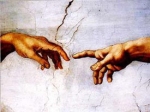Verse: Zechariah 14:16-18 Then everyone... shall go up year after year to worship the King, the Lord of
hosts, and to keep the Feast of Booths. And if any of the families of the earth do not go up to Jerusalem
to worship the King, the Lord of hosts, there will be no rain on them. ESV
Zechariah 14 makes a clear reference to the Feast of Tabernacles. Many details of the interpretation of
this prophecy may seem to be vague, but prophecies have a way of unfolding themselves with accuracy
and precision. The scholars of Jesus’ days debated over the prophecies concerning the birth of the
Messiah. This continued even after He was born and it was not until much later after the Resurrection
that the Scriptures were “opened up” for complete revelation. (Luke 24:13-35)
Paul says:
1 Corinthians 13:8-11
Love never ends. As for prophecies, they will pass away; as for tongues, they will cease; as for
knowledge, it will pass away. For we know in part and we prophesy in part, but when the
perfect comes, the partial will pass away. ESV
In this session we will look at the parts of Zecheriah 14 that we know and let the rest wait for more
complete revelation.
A time of great distress.
The beginning of the chapter talks of a time of trouble, war, and oppression on the people of Jerusalem
that is beyond what anyone can handle. “Jerusalem” can mean the population, the city, the whole
nation of Israel, or people of God in general. “Jerusalem can refer to believers, the ekklesia, or the
Church. I believe that the prophecy can be true for all of the above frames of reference. The idea that
prophetic visions can only be literal to be true is not accurate, and often the idea that every prophecy is
only a spiritual “idea” or “picture” can be misleading as well. 1 Peter 2:5 says that we are “living stones”
built into a spiritual house. In Matthew 15:14 Jesus says that we are a “city set on a hill”. So the
beginning of the chapter talks about trouble in Jerusalem.
So what I see in this is that the people of God are under stress and enduring warfare, rape, and plunder
that is beyond their strength. These are not people being “punished” by God for wrong doing or idolatry,
they live in a world that still carries the fruit of sin: the world hates God so it hates the people of God.
Jesus promised that “in the world you will have trouble” (John 16:33). As the fruit of sin grows to
maturity, hatred, wars, rape, murder and atrocities increase. Sukkot is the final harvest feast and just
before the ingathering and celebration of YHWH’s rule, every fruit of sin will be gathered and destroyed
(see Matthew 13:24-30).
The day (season) of battle.
It is the LORD himself that will accomplish this with His people.
Zechariah 14:3-4,5
Then shall the Lord go forth and fight against those nations, as when He fought in the day of
battle. And His feet shall stand in that day upon the Mount of Olives,
….and the Lord my [Zechariah's] God shall come, and all the holy ones [saints and angels] with
Him. [Amos 1:1; Col 3:4; 1 Thess 4:14; Jude 14,15.] AMP
A unique day.
Zechariah 14:6-7
And it shall come to pass in that day that there shall not be light; the glorious and bright ones
[the heavenly bodies] shall be darkened. But it shall be one continuous day, known to the Lord--
not day and not night, but at evening time there shall be light. AMP
During the Feast of Tabernacles, the Temple doors were not closed at the end of the day’s service. They
were left open continuously for the priest and people to celebrate in the light of the giant pillars that
were lit each day in the temple outer court. This was the only time of the year that the Temple doors
were left open. The feast celebration reflects these verses in Zechariah.
Living waters.
Zechariah 14:8
And it shall be in that day that living waters shall go out from Jerusalem. AMP
The daily water ceremony during the Feast of Tabernacles reflects this aspect of the prophecy as well.
Jesus interrupted the water procession to identify Himself as the “Light of the World” and “The Living
Water”, and both of these rather significant aspects of the feast in Zechariah’s vision.
All the nations have one King.
Zechariah 14:16-17
And everyone who is left of all the nations which came against Jerusalem shall even go up from
year to year to worship the King, the Lord of hosts, and to keep the Feast of Tabernacles or
Booths. And it shall be that Whoso of the families of the earth shall not go up to Jerusalem to
worship the King, the Lord of hosts, upon them there shall be no rain. AMP
The feast is a rehearsal of a future reality. There will come a time when the King of Kings and the LORD
of Lords will establish His throne on the earth. (Let your kingdom come, let your will be done on earth as
it is in heaven…) Both the feast and the prophecy describe this event.
One of the aspects of this rule that seems a little out of place is the punishment for not honoring the
feast. The phrase “there shall be no rain” means that “nothing will prosper or become fruitful”. It may or
may not refer to actual rain on the land of a nation. But we must understand that the rule and reign of
Christ is a cataclysmic revolution--things WILL drastically change on earth. We will not always battle sin,
fatigue, disease, and death. We will actually see the victory even as the Messiah was actually born on
Passover day.
This is cause for great celebration indeed!
The common (profane) things become holy.
Zechariah 14:20-21
In that day there will be inscribed on the bells of the horses, " HOLY TO THE LORD." And the
cooking pots in the Lord's house will be like the bowls before the altar. Every cooking pot in
Jerusalem and in Judah will be holy to the Lord of hosts; and all who sacrifice will come and
take of them and boil in them. And there will no longer be a Canaanite in the house of the Lord
of hosts in that day. NASU
Only the high priest wore the golden miter with the words “HOLY TO THE LORD” engraved upon it. The
high priest is of course a type or picture of our Great High Priest, Jesus Christ, our Messiah. The purity of
the culture in this prophecy is such that every item used in the Temple service is set apart and Holy to
the Lord. During the times of the Temple, sacrifices could only be offered at one location with the use of
specific tools and implements. Often the meat of the sacrifices was shared among the people offering
the gift, the priests, and God. God’s portion was consumed on the altar of fire, and the people ate the
grain and meat potions as special meals.
In this vision we see that everything has become holy all of the time everywhere! There is no longer any
separation; the restoration of the nations is complete! The feast is not only a remembrance of Israel in
the wilderness in tents; it is also a picture of the completion of all things.
And there will no longer be a Canaanite in the house of the Lord of hosts in that day.
This is one of my favorite lines in Scripture!
The word “Canaanite” can also be translated as “trader” or “merchant”. So there will be no more
merchandizing in the house of the Lord. The Canaanites were one of the peoples that possessed the
land promised to Israel at Passover. The Canaanites coerced Israel to intermarry with them thus making
covenant agreements with them which was in direct violation to the will of God. God warned Israel that
they would entice them away from Him and seduce Israel into idolatry. This has been a problem forever.
We as individuals and as nations have been seduced by the things of this world for a long time. Here this
Scripture tells us the expulsion of mixture has become complete.
Driving out the “merchants”.
Jesus got violent (as a God of war might do) two times during His public ministry and drove out the
money changers and those who sold sacrificial animals to the people at the Temple. Both times He did
this was in the week just before Passover when every family in Jerusalem was purging the leaven in
preparation for the Passover celebration. Jesus told them:
Mark 11:17-18
"Is it not written, 'My house shall be called a house of prayer for all the nations'? But you have
made it a den of robbers." ESV
Prayer is communication, koinonia, fellowship, and intimacy. Jesus was driving out the merchants from
His Father’s house. Zechariah 14 and the feast describe the conclusion this problem.
Conclusion
The vision of Zechariah 14 has remaining questions and mysteries for our interpretation, but it clearly is
a picture of the fulfillment of the feast. The Feast of Tabernacles is a unique feast in that it will be the
only feast to be celebrated during the millennium. By the time the feast is fulfilled, all of the other feasts
will have already been fulfilled. The feast lasts for seven days and it comes in the seventh month--seven
is the number of completion. The Feast also includes an eighth day that is another special Sabbath
convocation. Eight is the number of new beginnings/eternity, so the Feast of Tabernacles lasts into
eternity.
Zechariah 14 pictures the beginning of eternity, the completion of restoration. The Feast of Tabernacles
is the last of the seven feasts, Zechariah is the next to the last book in the Old Testament, and Revelation
is the last book in the New Testament.
Revelation 21:22-22:1
I saw no temple in the city, for the Lord God omnipotent [Himself] and the Lamb [Himself] are
its temple. And the city has no need of the sun nor of the moon to give light to it, for the
splendor and radiance (glory) of God illuminate it, and the Lamb is its lamp. [Isa 24:23; 60:1,19.]
The nations shall walk by its light and the rulers and leaders of the earth shall bring into it their
glory.
And its gates shall never be closed by day, and there shall be no night there. [Isa 60:11.]
They shall bring the glory (the splendor and majesty) and the honor of the nations into it.
But nothing that defiles or profanes or is unwashed shall ever enter it, nor anyone who commits
abominations (unclean, detestable, morally repugnant things) or practices falsehood, but only
those whose names are recorded in the Lamb's Book of Life. AMP
These Scriptures along with the Great Feast describe our hope and the conclusion of our restoration.
What a reason for joy and celebration!





Terms & Conditions
Subscribe
Report
My comments